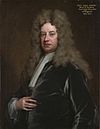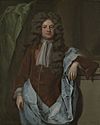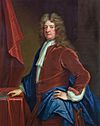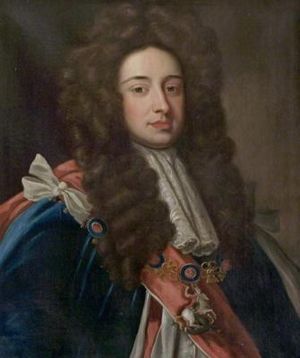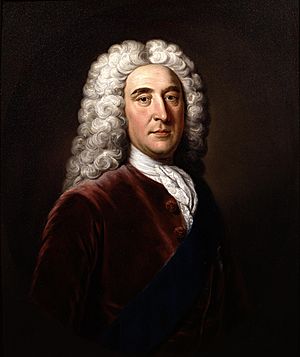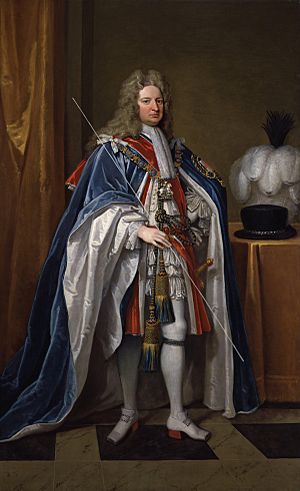Robert Monckton (died 1722) facts for kids
Robert Monckton (born around 1659, died 1722) was an English landowner and politician. He was a member of the Whig party. He served in the English and later the British House of Commons from 1695 to 1713. Robert Monckton played an important role in the Glorious Revolution, supporting William of Orange. He was also known for being involved in some very tough and long-lasting election arguments.
Contents
Early Life and Family Background
Robert Monckton's father was Sir Philip Monckton. His family lived in Cavil, near Howden, in Yorkshire. His mother was Anne Eyre, from Highlow Hall in Derbyshire. Robert was the oldest child. He had a brother named William, who was a naval officer, and a sister named Margaret.
Robert Monckton's schooling was not very regular. When he was 17, in 1677, he started studying at Sidney Sussex College, Cambridge. This college was also where Oliver Cromwell had studied. By 1678, he was learning about law at the Middle Temple. He took over his family's lands when he was about 20 years old.
Joining the Revolution
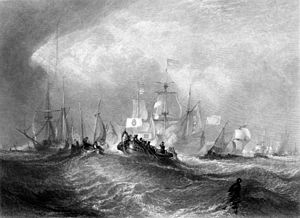
Unlike his father, Robert Monckton had friends who were Puritans. He was seen as a Low Church supporter in Parliament. He strongly disagreed with the Duke of York, who later became King James II. In the 1680s, Robert Monckton went to live in the Netherlands. There, he became an officer for William, Prince of Orange, in 1688. He was part of the invasion that led to the Glorious Revolution of 1688. As a reward, he got a job as a Commissioner for Trade and Plantations. This meant he helped manage trade and colonies.
Becoming a Politician
Representing Pontefract
Monckton became a supporter of a powerful Whig leader, John Holles, 1st Duke of Newcastle-upon-Tyne. With the Duke of Newcastle's help, he ran for election in Pontefract. This area had usually voted for the Tory party. This was during the 1695 English general election. His Whig partner was Sir William Lowther. Lowther was a Presbyterian landowner. People sometimes made fun of him for giving out wine to voters.
However, Monckton and Lowther had made sure to get many votes from special properties called burgages. There were also many Dissenters (non-Anglican Protestants) in the town. Lowther got the most votes, and Monckton was a close second. A defeated Tory candidate, Sir John Bland, complained about the election. He said there was cheating by the person in charge of the election. But his complaint was not successful.
The elections led to the Whigs having more power in the House of Commons. King William III started to rely on the Whig Junto. This was a small, powerful group of Whig leaders. Monckton was part of the Country Whigs. These were Members of Parliament (MPs) from outside London. They usually supported the Whig government. But they did not always agree with the more extreme ideas of the Junto. Monckton stayed a strong Whig. He did not move towards the Tory party, unlike some others.
Monckton usually supported the King's money requests. For example, he voted to set the value of the guinea coin. However, he voted against punishing Fenwick. Fenwick was a Jacobite (a supporter of James II) who had been part of a failed plot. In 1697, Monckton was asked to be a witness by the House of Lords. This was about matters concerning the Earl of Monmouth. Monmouth had been Monckton's commander in 1688. He was accused of being involved in Fenwick's plot.
Monckton was an independent thinker. In April 1697, he voted and acted as a teller against a tax bill. He also strongly wanted to reduce the size of the army. He helped manage a bill against corrupt juries. He led a committee on this issue. But the bill did not pass before new elections were called in 1698.
In the 1698 English general election at Pontefract, Sir William Lowther did not run again. A new Whig candidate, John Bright, joined the election. Bright and Monckton did not work together. As a result, the Tory candidate, Bland, won the most votes. Bright came second, and Monckton was a very close third. Monckton complained about the result. He said some of Bright's voters should not have been allowed to vote. Bright made similar complaints about Monckton. The committee investigating found in Bright's favor. They tried to declare him elected, but it failed. A motion for Monckton also failed. So, a new election was called. This time, Bright beat Monckton. But there were more complaints about cheating. Monckton quickly used his connection with the Duke of Newcastle to find a safer place to run for election.
Representing Aldborough
The Duke of Newcastle offered Monckton a chance to run in Aldborough. The Duke had recently bought control of this area. Aldborough had seen tough elections before. It was a "scot and lot" area, meaning many people could vote, even though there were not many voters. Because of Newcastle's influence, Monckton was elected as a Member of Parliament without anyone running against him in January 1701.
The Parliament at this time had more Tories. The Whig Junto leaders were soon accused of serious crimes. A motion was made to ask the King to recognize the Duke of Anjou (King Louis XIV's grandson) as 'King of Spain'. This was a direct challenge to King William's foreign policy. Monckton strongly spoke out against this. He said that if this vote passed, the next step might be to recognize the "Old Pretender." This was James Francis Edward Stuart, who was supported by Louis XIV as the rightful king. Monckton demanded support for England and its allies. He said he would "eat only roots" for his country's good. This showed how strongly he felt.
Later, there were efforts to remove the Junto members (Somers, Halifax, Orford, and Portland) from the King's council. Monckton had disagreed with their extreme ideas before. But he felt he had to defend them against being removed from office. When the debate happened, Monckton suggested an amendment. He wanted the House to "support the King in preventing the union of France and Spain." He also wanted them to support "maintaining the trade and commerce of this kingdom." This led to a heated debate. Monckton warned of bad trade consequences. Harley, who was the Speaker, tried to silence Monckton. But Monckton kept speaking, even when told to stop.
Parliament was dissolved later that year. For the second election of 1701, Monckton promised Newcastle he would support other Whig candidates in Yorkshire. He was elected again, but this time it was a contested election. In the 1702 English general election, Monckton was elected without opposition.
Monckton and his partner were elected without opposition again in the 1705 English general election. Monckton did not have as much influence after these early years. He became more of an agent for Newcastle. He helped Newcastle deal with Harley. He was appointed to the Board of Trade in 1707. This job helped him learn more about business and trade. He was elected again in 1708 and generally supported Whig ideas. In 1710, he was elected again without opposition. He supported the Hanoverian Succession, which meant the next king would come from Hanover.
In 1711, the Duke of Newcastle died. His nephew, Thomas Pelham-Holles, took over his title. Monckton tried to help with property disagreements between the new Duke and the old Duchess. But he ended up upsetting both of them. Because of this, the Duchess said she would not support him in Aldborough. Monckton remained friends with Harley, who was now the head of a Tory government. Monckton still voted with the Whigs on most issues. However, he voted against his party on a trade agreement with France in 1713. This finally made him lose his safe seat. In the 1713 British general election, he did not run in Aldborough. He tried his luck again in Pontefract. But he came in last place.
Even after this, Monckton stayed involved in politics for another year. He continued to give evidence to the Board of Trade. This was especially about the actions of Arthur Moore. Moore was a friend of Henry St John, 1st Viscount Bolingbroke. Moore had been involved in trade talks with Spain. He was accused of making personal profit from this work. Monckton accused him of not asking the Board of Trade for advice. He also claimed to have seen a letter about a large bribe Moore was promised. It seems Monckton's attack was planned with a group of Whig leaders.
The queen died in August 1714. With a new king and a new Parliament, Monckton retired to his lands in Yorkshire. He died in 1722 and was buried on November 13.
Marriage and Family Life
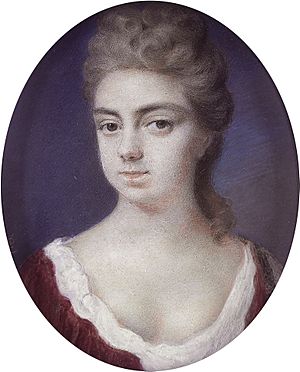
In 1692, Robert Monckton married Theodosia Fountaine. She was the daughter of John Fountaine, from Melton on the Hill and Hodroyd, both in Yorkshire. They had several children. Robert's main heir was John Monckton. He later became the 1st Viscount Galway. John was a very successful Whig politician. He was also more willing to follow the Pelhams (another powerful political family) than his father had been.
 | Delilah Pierce |
 | Gordon Parks |
 | Augusta Savage |
 | Charles Ethan Porter |


